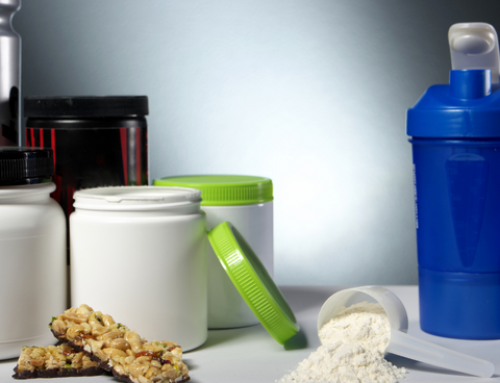Tips for Safely Buying Supplements Online
![]()
Enhancing your sports performance with supplements is quite common, but what happens when you buy supplements that are fake? The Food and Drug Administration reports that the supplement industry has grown from $6 billion to over $35 billion in annual sales over past 20 years. But his surge of revenue includes fake supplements, which could cause severe side effects, from companies looking to con you out of your money.
RELATED: 4 Muscle-Building Supplements That Don’t Work
The World Health Organization has sent out warnings about misleading products that apply to life or death situations. The statement refers to many medical products, but sports supplements are being sold through misleading means as well. Buying supplements online has become the easiest way to acquire quality products not sold in stores, but you must exercise caution when you search the Internet for lower prices.
Beware of Amazon and eBay Supplement Sellers
Legitimate companies that sell on Amazon and eBay include the user name after their brand. Brands know if a fake company is claiming to be them, as is shown in this warning released by Men’s Health. The ones you need to beware of are users who have no website information or any way to be contacted.
Every year thousands of people buy fake supplements that look identical to the real thing. The difference is what each powder or capsule contains. Some make an attempt to reproduce the product with fewer ingredients, while others give you nothing beneficial for sports enhancement. Always check the seller’s reviews to see what others verified buyers have said. A misleading company will almost always have negative reviews.
RELATED: Sports Supplements: What’s Safe, Effective and Legal?
Misleading Website Homepages
The homepages that sell expensive and ineffective supplements seem to be one of the top scams. These homepages contain no contact information and only have an area for you to input your personal information. They usually claim to give you a free one-month supply of their product, but if you don’t cancel your order on time, they bill you for a year’s worth of supplements.
These websites usually feature images of a fit man and/or woman who have no relation to the company. Trusted supplement brands display sponsored athletes and reps. Companies looking to steal your money don’t give free products to reps, because they are generally ineffective. A good press release covers this type of fraud pretty well.
Consumer-Based Reviews and Websites Can Help
Consumer reviews have opened a path to preventing the purchase of scam products. You want results from your sports performance, and you surely don’t want a supplement to harm your body. Always check the website called Supplement Reviews. They post consumer reviews of supplements—no company or anyone related to a supplement company can post reviews.
Another good consumer website to refer to is Protein Daily. Protein is a supplement widely used by athletes, probably a leader in sales volume. This website gives all you need to know about protein, which companies sell bogus protein supplements and which ones sell the real thing. Take advantage of what others have said about supplements they actually used.
However, be cautious. Some so-called consumer websites are also fake. If they only promote one product, they are most likely affiliated with a fake supplement company.
RELATED: Workout Supplements: Do You Really Need Them?
Buying Supplements Straight from the Brands Costs More
When you visit a supplement brand’s main page, you will see a list of prices. These are usually retail market prices, and not necessarily what they actually sell their products for. Go onto the brand’s Amazon page; in most cases, you will see a lower price.
You can also look at trusted retailers like Lockout Supplements. They probably sell your favorite products for a fraction of the cost you would pay on other websites representing the brand. The point of buying supplements online is to save money and get quality products, not spend more money.
The bottom line is simple: When shopping for supplements, always be skeptical. Remember that some companies are trying to scam you, looking to get your money by selling fake or tainted products. Check consumer websites and reviews, and search for fraud alerts on any product you’re seeking to buy.
RECOMMENDED FOR YOU
MOST POPULAR
Tips for Safely Buying Supplements Online
![]()
Enhancing your sports performance with supplements is quite common, but what happens when you buy supplements that are fake? The Food and Drug Administration reports that the supplement industry has grown from $6 billion to over $35 billion in annual sales over past 20 years. But his surge of revenue includes fake supplements, which could cause severe side effects, from companies looking to con you out of your money.
RELATED: 4 Muscle-Building Supplements That Don’t Work
The World Health Organization has sent out warnings about misleading products that apply to life or death situations. The statement refers to many medical products, but sports supplements are being sold through misleading means as well. Buying supplements online has become the easiest way to acquire quality products not sold in stores, but you must exercise caution when you search the Internet for lower prices.
Beware of Amazon and eBay Supplement Sellers
Legitimate companies that sell on Amazon and eBay include the user name after their brand. Brands know if a fake company is claiming to be them, as is shown in this warning released by Men’s Health. The ones you need to beware of are users who have no website information or any way to be contacted.
Every year thousands of people buy fake supplements that look identical to the real thing. The difference is what each powder or capsule contains. Some make an attempt to reproduce the product with fewer ingredients, while others give you nothing beneficial for sports enhancement. Always check the seller’s reviews to see what others verified buyers have said. A misleading company will almost always have negative reviews.
RELATED: Sports Supplements: What’s Safe, Effective and Legal?
Misleading Website Homepages
The homepages that sell expensive and ineffective supplements seem to be one of the top scams. These homepages contain no contact information and only have an area for you to input your personal information. They usually claim to give you a free one-month supply of their product, but if you don’t cancel your order on time, they bill you for a year’s worth of supplements.
These websites usually feature images of a fit man and/or woman who have no relation to the company. Trusted supplement brands display sponsored athletes and reps. Companies looking to steal your money don’t give free products to reps, because they are generally ineffective. A good press release covers this type of fraud pretty well.
Consumer-Based Reviews and Websites Can Help
Consumer reviews have opened a path to preventing the purchase of scam products. You want results from your sports performance, and you surely don’t want a supplement to harm your body. Always check the website called Supplement Reviews. They post consumer reviews of supplements—no company or anyone related to a supplement company can post reviews.
Another good consumer website to refer to is Protein Daily. Protein is a supplement widely used by athletes, probably a leader in sales volume. This website gives all you need to know about protein, which companies sell bogus protein supplements and which ones sell the real thing. Take advantage of what others have said about supplements they actually used.
However, be cautious. Some so-called consumer websites are also fake. If they only promote one product, they are most likely affiliated with a fake supplement company.
RELATED: Workout Supplements: Do You Really Need Them?
Buying Supplements Straight from the Brands Costs More
When you visit a supplement brand’s main page, you will see a list of prices. These are usually retail market prices, and not necessarily what they actually sell their products for. Go onto the brand’s Amazon page; in most cases, you will see a lower price.
You can also look at trusted retailers like Lockout Supplements. They probably sell your favorite products for a fraction of the cost you would pay on other websites representing the brand. The point of buying supplements online is to save money and get quality products, not spend more money.
The bottom line is simple: When shopping for supplements, always be skeptical. Remember that some companies are trying to scam you, looking to get your money by selling fake or tainted products. Check consumer websites and reviews, and search for fraud alerts on any product you’re seeking to buy.
[cf]skyword_tracking_tag[/cf]









